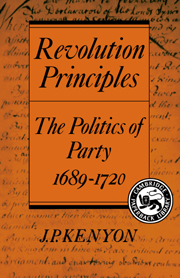Book contents
- Frontmatter
- Contents
- Preface
- Preface to the paperback edition (1990)
- 1 Introduction
- 2 By force or by miracle
- 3 The measure of submission
- 4 This skein of tangled principles
- 5 King Charles's head
- 6 The bloody flag
- 7 Revolution Principles
- 8 Black and odious colours
- 9 The four last years
- 10 That triumphant appellation
- 11 Conclusion
- Appendix
- Abbreviations
- Notes
- Addendum
- Index
- Frontmatter
- Contents
- Preface
- Preface to the paperback edition (1990)
- 1 Introduction
- 2 By force or by miracle
- 3 The measure of submission
- 4 This skein of tangled principles
- 5 King Charles's head
- 6 The bloody flag
- 7 Revolution Principles
- 8 Black and odious colours
- 9 The four last years
- 10 That triumphant appellation
- 11 Conclusion
- Appendix
- Abbreviations
- Notes
- Addendum
- Index
Summary
In the past twenty years much important work has been published on the identity, the formation and the tactics of the two major political parties under William III and Anne, but very little on their political ideas. The political thought of the age has been explained largely in relation to the writings of John Locke, supplemented occasionally by those of Hobbes, Harrington and Algernon Sidney. The political leaders of Whiggism after 1689 are assumed to have embraced a fully developed ‘Lockean’ ideology, giving the nation the right to depose kings under the terms of the Original Contract. This sophisticated and up-to-date weapon, it is assumed, gave them the initiative in a power struggle which ended only with the accession of George I. The Tories, on the other hand, were saddled with such outdated concepts as divine right and hereditary succession, which by implication denied the validity of the very Settlement under which they operated. This numbing internal contradiction in their philosophy ensured their eventual defeat.
In this case, it is difficult to see why Locke's theories of government should have been mentioned so rarely in the early stages of the Revolution, up to 1692, and even less thereafter, unless it was to heap abuse on them. It is also hard to understand why Whig politicians who are supposed to have been his deferential disciples should have been so reluctant to use his name.
- Type
- Chapter
- Information
- Revolution PrinciplesThe Politics of Party 1689–1720, pp. 1 - 4Publisher: Cambridge University PressPrint publication year: 1977

